Today´s discussion
What are your ideas for shaping AI to serve the public good ?
consultations among citizens and experts ahead of the AI Action Summit
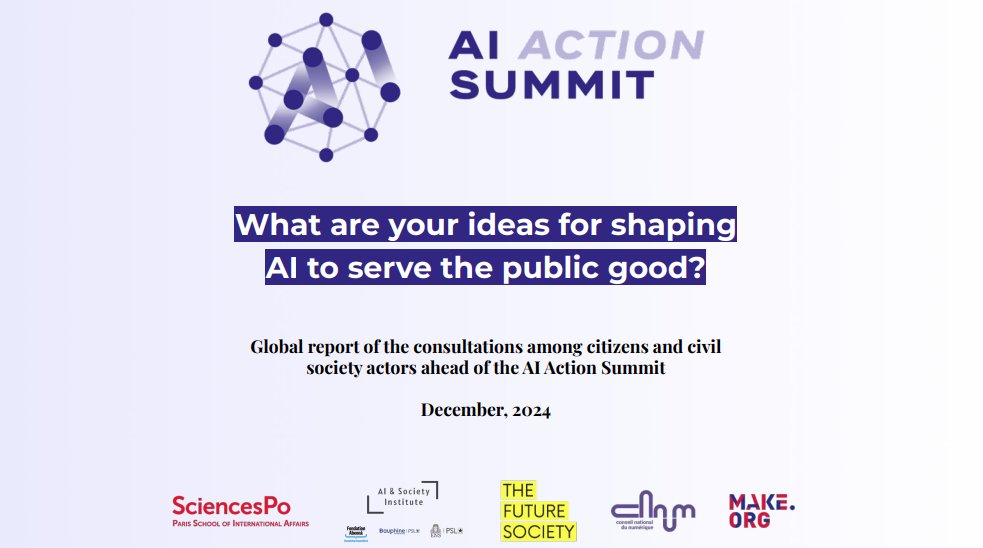
How many times experts are not necessarily in phase with the general public ?
Too many you would say...
This is what is really interesting about this report presented at the 6th Athens Roundtable edition on AI and the rule of law.
"What are your ideas for shaping AI to serve the public good?" report summarizes the key findings and deliverables from a global consultation of citizens and experts on shaping AI to serve the public good with the purpose to deliver concrete ideas to the 2025 AI Action Summit, initiative of the French President, Emmanuel Macron.
The consultation had wide and diverse participation from 10,000 citizens and over 200+ expert organizations across 5 continents which lead to very interesting discoveries. The consultation included professionals from civil society and academia, Sciences Po, the AI & Society Institute, The Future Society, CNNum, and Make.org.
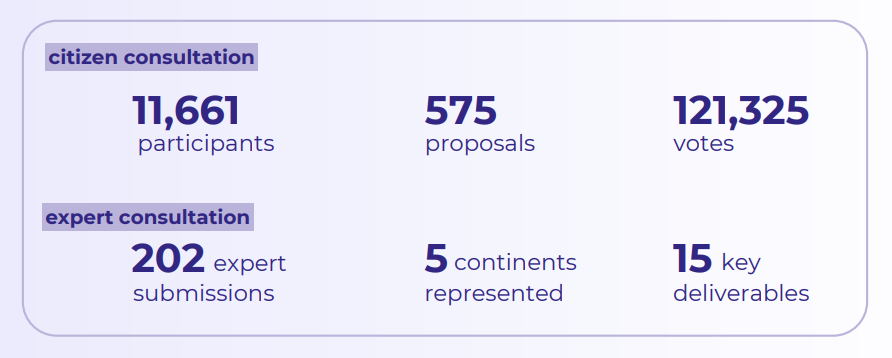
The Key Takeaways from the Open Consultation
From the Public Consultation
- The participation was wide, diverse and led to the expression of sophisticated, nuanced views on AI. With that in mind, any discourse claiming that the public lacks basic awareness and literacy to engage with governance should be questioned and I believe, pushed aside.
- There is a unanimous support for more education resources to be made available and accessible to all, regardless of gender, ethnicity, wealth, revenue and age. AI training is seen as essential not just to adapt to sociable transformations, but also to empower citizens to engage actively in governance and enable equitable, fair distribution of AI benefits.
- The public strongly rejects AI solutionism. That is a scenario in which AI is developed everywhere, for everything in an uncontrolled setting dominated by private interest. Instead, they express support for international governance that enables collective use of AI to ensure concrete real world problems. They prioritize sectors that enhance human expertise and public trust, such as health, public innovation, climate, action, fight against disinformation and others.
The consultations that we've undertaken with experts and CSOs converge with these takeaways and complete them. They join the public in their call for strong international governance and they want to be part of a multi stakeholder governance framework at all stages, from policy design to implementation and evaluation.
They want actionable international standards to evaluate, audit and compare models in terms of transparency, fairness, environmental impact and privacy. These standards must safeguard existing rights, promote accountability and guide adoption and investments. Experts and CSOs won the summit to address both current harms, but also long term systemic threats and catastrophic risks. In particular, they support a greater coordination on AI safety research, verifiable enforcement of thresholds and other forms of control on large scale models. -
The public is particularly concerned by the amplification of existing inequalities through deployment of AI systems, whether they are gender based, income based, ethnicity based and at a larger scale between Global north and Global South. They support enforceable mechanisms which enhance diversity, representation and ensure anyone can harness effectively and equitably AI.
Here is the summary from the report :
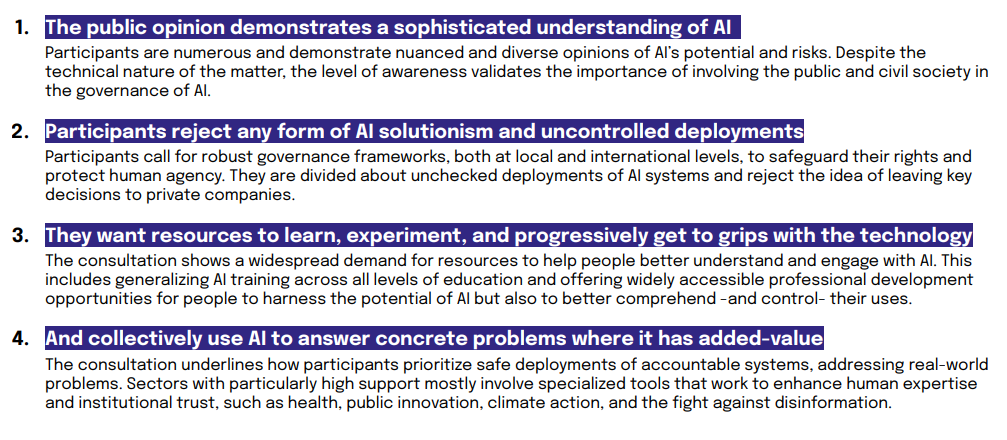
From the Expert Consultation
-
The summit must be a foundational moment for strong and recurring multi stake or the governance process.
-
It must ensure access to qualitative AI education and training for everyone.
-
It must establish global verifiable standards for safe and responsible AI.
-
Sustainability of development and deployment of AI is non negotiable. We must ensure benefits outweighs the cost, even when it comes to the environment, or especially when it comes to environment.
-
The Summit must prioritize AI solutions, addressing existing challenges, protecting existing rights.
Here is the summary from the report :
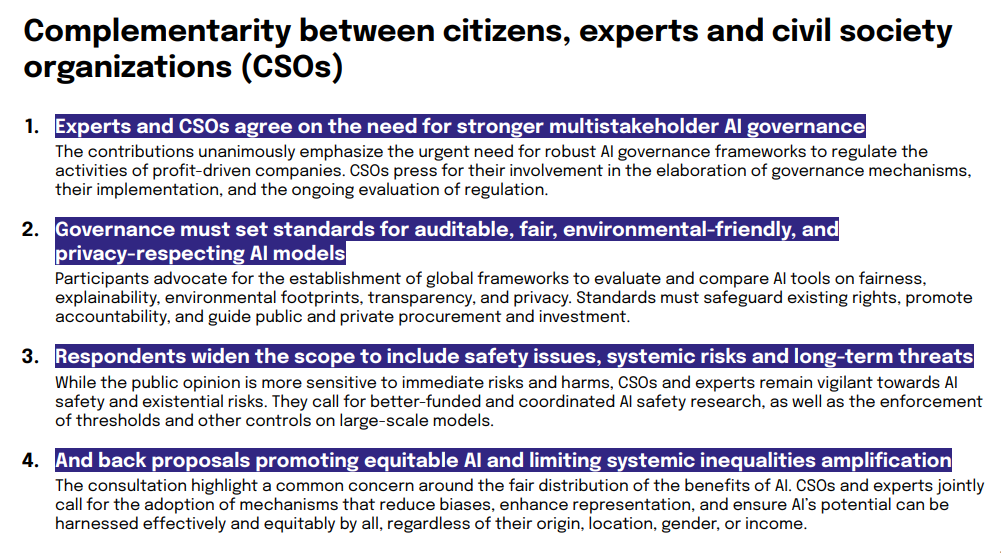
The Expert Consultation on AI
The experts emphasized the need for these deliverables to be concrete, implementable and aligned with both public interest and expert priorities.
The proposals aim to foster strong, multi-stakeholder global AI governance:
-
Global AI Governance:
- Establish a permanent governing body for future AI summits, such as a "Paris Pact" task force
- Facilitate more scientific consensus on AI risks through an international collaboration similar to the IPCC
- Ensure broader inclusion of civil society and Global South stakeholders in global AI governance
-
Trust in AI:
- Develop enforceable "red lines" for advanced AI development
- Enhance responsible scaling policies through an "AI Corporation Commitment Report Card"
- Strengthen an international network of AI safety institutes to develop collaborative testing frameworks
-
Cross-Cutting Priorities:
- Roadmap for global, verifiable AI auditing standards
- Establish a global charter for "public interest AI" with a new definition
- Increase processes for meaningful citizen engagement in AI governance
Here is their proposal:
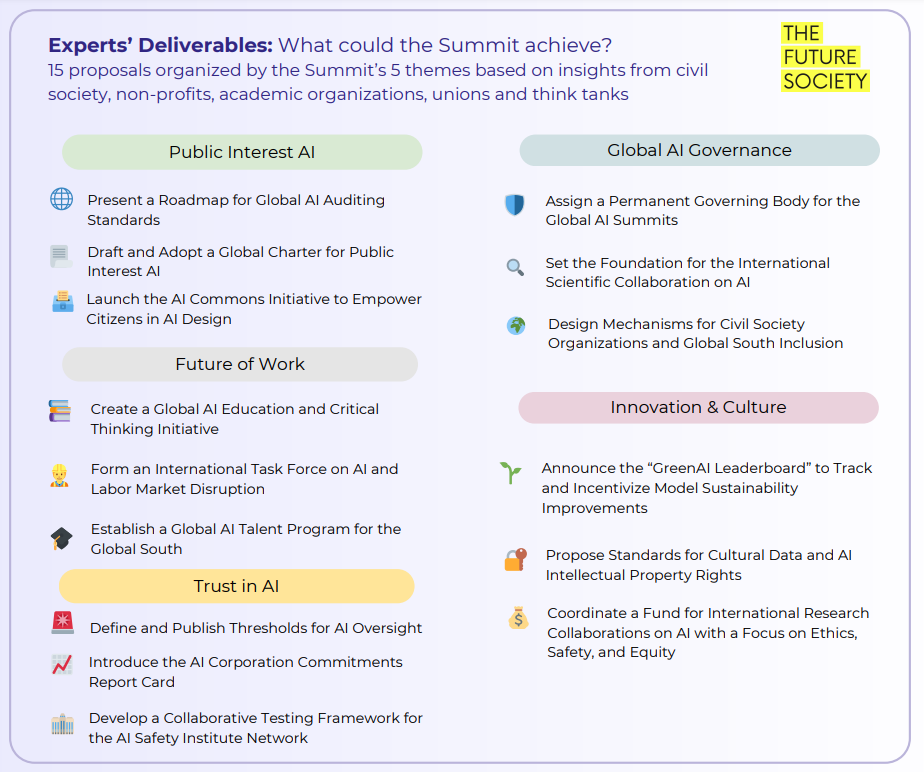
The Consultation Top Priorities and Recommendations
The key priorities and recommendations detailed below from both public and experts consultations are :
- Establish a permanent governing body for recurring global AI summits with clear goals and membership criteria.
- Facilitate stronger scientific consensus on AI risks through an international collaborative panel similar to the IPCC.
- Ensure broader inclusion of civil society and Global South stakeholders in global AI governance processes.
- Develop enforceable "red lines" and responsible scaling policies for advanced AI development.
- Create unified standards and auditing frameworks for evaluating AI systems.
- Define clearer guidelines for public interest-aligned AI development and deployment.
- Implement more robust mechanisms for meaningful citizen engagement in AI governance.
- Launch initiatives to address both risks and opportunities of AI's impact on the future of work.
- Establish standards and incentives to promote sustainable, environmentally-friendly AI development.
- Protect cultural data rights and enable fair, equitable cultural data markets.
Below is an easy takeaway from the full report:
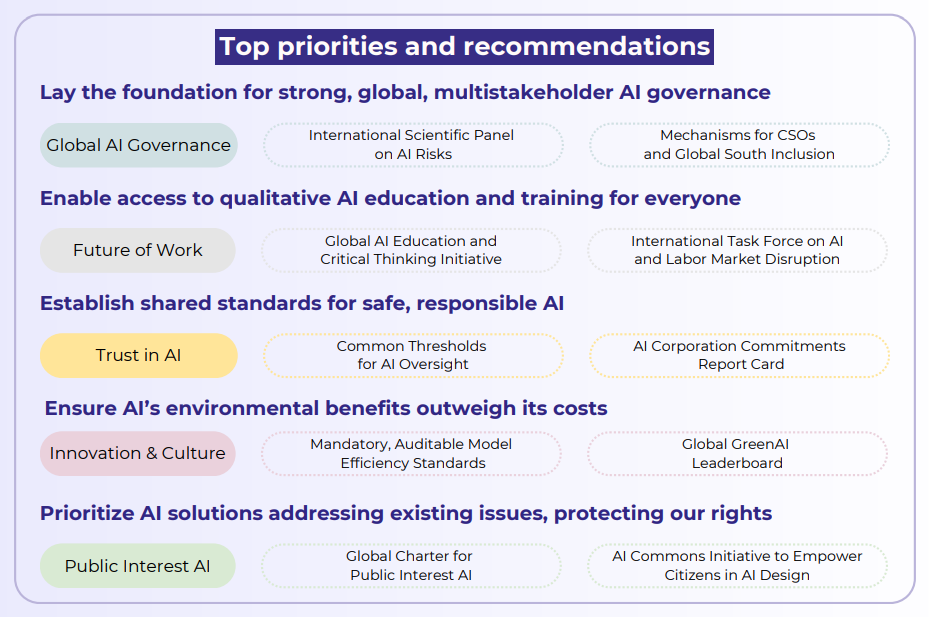
Big applause to The Future Society, AI & Society Institute (ENS-PSL), Sciences Po’s Tech & Global Affairs Innovation Hub, the French Digital Council (CNNum) and Make.org for this very extensive report unifying public and experts ideas for shaping AI to serve the public good.
We invite you to read the full report with detailed information or its 4-page summary.
